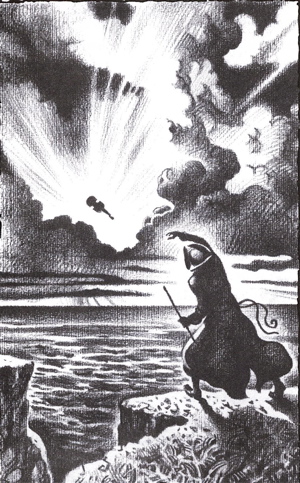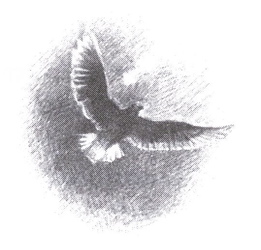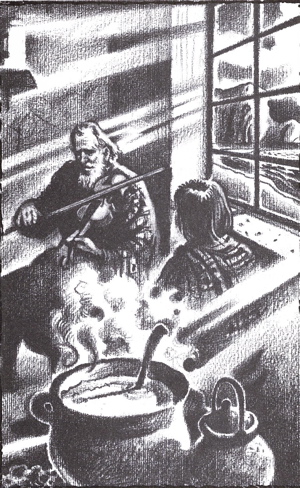Higher the music rose. Higher and higher above the island. Leaping across the purple heather. Laughing down the glens and through the high hills. Sweeping over the silver sea. Higher and higher into the skies, until it seemed to touch the very arch of heaven itself...
Forbidden Q&A
 Is Forbidden a true story? Is Forbidden a true story?
No, it's a work of fiction. But the historical background is true enough. There were many parts of Scotland in the 18th and 19th centuries where music was forbidden by the Church and State. No pipes, no fiddles. In some places all the fiddles were destroyed, and the musical tradition all but died out. Somewhere, sometime, someone had to bring it back again.
Why did they forbid music?
Partly it was political. It was thought bagpipes could stir up the Jacobite rebellious spirit in the people. And partly it was religious. Music leads to dancing ... and we all know what dancing can lead to! Lust and sin. "Devil's music" indeed! The French edition of Forbidden is in fact called La musique du diable ... a much better title, I think.
Where did you get the idea?
I used to play piano with a Scottish dance band. Our fiddler, Verona Burgess, spent much time studying and playing the music, especially in Shetland. Verona used to tell us the history, and especially the stories of how the Church tried to suppress the joy of traditional music. They made a great impression. on me And there's a famous Scottish tune called "De'il Stick the Minister."
Casting out the "devil's music" by Mark Sofilas.
How did you write the story?
 I was at a party, and a young girl who knew my books asked what I was going to write next. I said I was going to Britain for a holiday and should think of a story to research while I was there. Suddenly, the whole story of Angus and his enchanted fiddle flashed into my mind. I was at a party, and a young girl who knew my books asked what I was going to write next. I said I was going to Britain for a holiday and should think of a story to research while I was there. Suddenly, the whole story of Angus and his enchanted fiddle flashed into my mind.
I stopped in mid-sentence as the little drama played itself out in my imagination. As soon as I got home I wrote down the outline of the story. It didn't change very much, although I added an outer story of a boy who visits the island today and is told the tale of Angus and his enchanted fiddle.
Seabirds soaring like music, by Mark Sofilas.
Do all stories come in a flash of inspiration?
I wish they did! The Muse is very powerful for a writer – but she's also very fickle. She doesn't visit often ... and even when she does, the ideas she brings usually take a long time to develop and realise.
I've only had two books come "in a flash" like that. One was Forbidden. The other was The Grandfather Clock. In both cases it wasn't like creating a story. It was like taking dictation – as if the tale had already happened and all I had to do was write it down.
 What's the best part of writing? What's the best part of writing?
The best part of writing is the response you get from your readers. We all write to be read, and in some way to touch the inner lives of other people. And Forbidden brought one of the best responses I've had to a book.
Not long ago a woman bought a copy of Forbidden from my stall at the Old Bus Depot Market in Canberra. Her son had read the book at school and enjoyed it. Now he wanted a copy of his own.
A short while later the mother brought her boy to meet me at the market. He was a nice lad, but to look at him you'd have thought he'd be much happier on a football field than reading a book.
But no! He'd gone one better. The boy had started taking violin lessons ... learning to play the music himself.
No author can ask more of his work than that!
As he picked up the fiddle for the first time, Angus seemed to hear it hum: calling softly in anticipation of the music that was to come. And as drew the bow across the strings, Angus felt the air vibrating all around him. The note hung in the room, shimmering in its power. Angus shivered, as if he were playing on the strings of his own body.
The first music, by Mark Sofilas
|